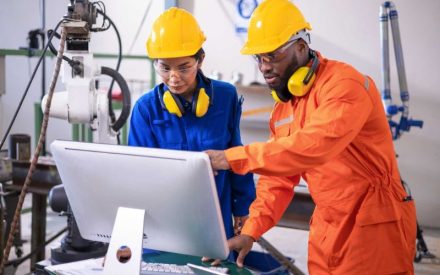Training programs play a pivotal role in equipping manufacturing workers with the essential skills and knowledge required to thrive in today’s dynamic industrial landscape. In an era characterized by rapid technological advancements and evolving industry demands, staying ahead necessitates a commitment to continuous learning. Training programs tailored for manufacturing workers serve as catalysts for professional growth, fostering adaptability and proficiency.
These initiatives go beyond conventional education, providing hands-on experiences and specialized instruction that directly align with the intricacies of the manufacturing sector. As organizations increasingly recognize the pivotal role of a skilled workforce in achieving operational excellence, investing in comprehensive training programs has become imperative.
The Growing Concern: Understanding the Manufacturing Skills Gap
The manufacturing sector is undergoing a profound transformation, marked by automation, artificial intelligence, and the integration of advanced technologies. While these changes promise increased efficiency and productivity, they also demand a workforce adept at handling complex machinery and digital interfaces. The skills required in modern manufacturing go beyond traditional assembly line tasks, encompassing digital literacy, problem-solving, and adaptability.
However, the current workforce often lacks these crucial skills, leading to a widening gap between industry requirements and worker capabilities. This disconnect poses a serious threat to the competitiveness and sustainability of manufacturing businesses. As seasoned workers retire and technology continues to advance, the urgency to address this gap becomes more apparent.
Training Programs: A Strategic Solution
To tackle the skills gap head-on, manufacturing firms need to invest in comprehensive training programs that align with the evolving needs of the industry. These programs should go beyond basic skills training and encompass a holistic approach to workforce development. Here are key components that effective training programs for manufacturing workers should include:
Technical Skills Enhancement:
Focusing on technical skills is crucial in preparing manufacturing workers for the demands of modern machinery and automated systems. Training programs should cover a range of technical competencies, including equipment operation, troubleshooting, and maintenance. Collaborations with equipment manufacturers and technology providers can ensure that training content remains up-to-date with the latest industry advancements.
Digital Literacy Training:
The integration of Industry 4.0 technologies requires manufacturing workers to be digitally literate. Training programs should incorporate modules on data analysis, computer-aided design (CAD), and the use of specialized software. This digital literacy not only enhances efficiency but also empowers workers to contribute meaningfully to the digital transformation of manufacturing processes.
Soft Skills Development:
In addition to technical proficiency, soft skills play a pivotal role in the success of manufacturing workers. Effective communication, problem-solving, teamwork, and adaptability are essential in an environment that demands constant innovation. Training programs should include modules that nurture these skills, ensuring that workers can collaborate seamlessly and respond adeptly to evolving challenges.
Continuous Learning Initiatives:
The manufacturing landscape is dynamic, with technologies evolving at a rapid pace. Training programs should not be viewed as one-time events but rather as ongoing initiatives. Establishing a culture of continuous learning within the organization, supported by regular training updates and opportunities for upskilling, ensures that the workforce remains agile and responsive to industry changes.
Successful Case Studies: Models for Manufacturing Training Excellence
To illustrate the effectiveness of well-designed training programs, let’s examine two successful case studies in the manufacturing sector.
Case Study 1: Toyota’s Production System Training
Toyota, renowned for its lean manufacturing principles, has implemented a comprehensive training program that emphasizes continuous improvement and employee involvement. The program combines technical training for efficient machinery use with a strong emphasis on problem-solving and waste reduction. Toyota instills a culture of employee engagement and learning, resulting in a workforce capable of adapting to changing production requirements.
Case Study 2: Siemens’ Skill Development Initiative
Siemens, a global leader in industrial automation, has taken a proactive approach to address the skills gap. The company partners with educational institutions and vocational training centers, offering tailored programs for aspiring and existing manufacturing workers. Siemens’ initiative imparts technical skills and emphasizes digital literacy, preparing workers for smart technology integration in manufacturing processes.
Conclusion: A Collective Effort for a Resilient Future
Addressing the skills gap in manufacturing requires a collective effort from industry stakeholders, educational institutions, and policymakers. By investing in robust training programs, businesses can empower their workforce to meet the challenges of modern manufacturing. Continuous collaboration between industry players, the academia, and government bodies is essential to create a sustainable pipeline of skilled workers.
In conclusion, bridging the skills gap is an investment in the future of the manufacturing sector. As technology redefines the industry, training programs become a strategic solution to prevent workers from being left behind. By enhancing technical skills, providing digital literacy training, developing soft skills, and fostering a commitment to continuous learning, manufacturing businesses can build a resilient workforce capable of navigating the complexities of the modern industrial landscape.
JRG Partners has placed several manufacturing candidates with top manufacturing companies all across the US, we have recently placed a “Manufacturing Operations Manager(retained search)” with a Glass Products manufacturing company in Philadelphia, Pennsylvania. As we navigate the ever-evolving landscape, our commitment remains steadfast in providing tailored solutions that elevate workforce management, drive productivity, and fortify manufacturing enterprises for the challenges and opportunities of tomorrow.
